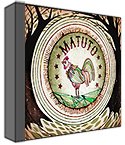The revelation, says guitarist Clay Ross, boiled down to a single song. It was a baião — a style of folk music from northeastern Brazil — by one of the masters of the genre that drove home to this South Carolina country boy-turned-New York City jazzman a connection that he could not deny.
“It’s a song called ‘Voa Ilza,’ by Hermeto Pascoal,’’ Ross says, putting down the burrito he’s been eating at a Brooklyn terrace to tap out the rhythm while he hums the melody. It’s a long, jaunty, sinewy number that, to an American ear, sounds a lot like something that just came down from the Appalachian foothills.
“I mean come on, man, that’s a fiddle tune!’’ Ross says. “It’s bluegrass! And the groove is sick.’’ He taps away at the table top. “It had everything I liked about good groove music. It had all these things I could identify with.’’
The epiphany set Ross on a path far different from the avant-garde jazz for which he’d come to New York in the first place, leaving behind the comfortable music scene of Charleston, S.C., for something edgy and abstract.
Instead, Ross formed Matuto, a band that mingles sounds of Brazil’s northeast — baião, forró, coco, frevo, and more — with American roots music like bluegrass, country, and the blues. Now a force in New York’s busy Brazilian scene, with an album on the Ropeadope label and many festival and workshop gigs in Recife, Brazil, under its belt, Matuto comes to Johnny D’s on Tuesday for a Brazil Independence Day celebration.
The shifting membership of Brazilian and American players has been known to reach nine musicians on stage, but on the road, Matuto works as a power trio, with Ross joined by Rob Curto on accordion and Zé Mauricio on percussion and electronics.
About half the songs have lyrics — originals and classics from both sets of traditions that Ross delivers mostly in English, and Curto in Portuguese. The layerings that ensue — for instance, Brazilian harmonies with English words against what feels like country music, but with subtle rhythmic cross-currents — feel like notes from an investigation in progress.
That’s because Ross’s epiphany didn’t come out of nowhere. It followed several years learning Latin styles from Cuban to tango for restaurant and other gigs, and a stint with Brazilian percussionist Cyro Baptista’s New York group Beat the Donkey.
Most of all, it tapped into the sounds and feelings of Ross’s own childhood in the upcountry town of Anderson, S.C., and forced him to think again about his roots.



